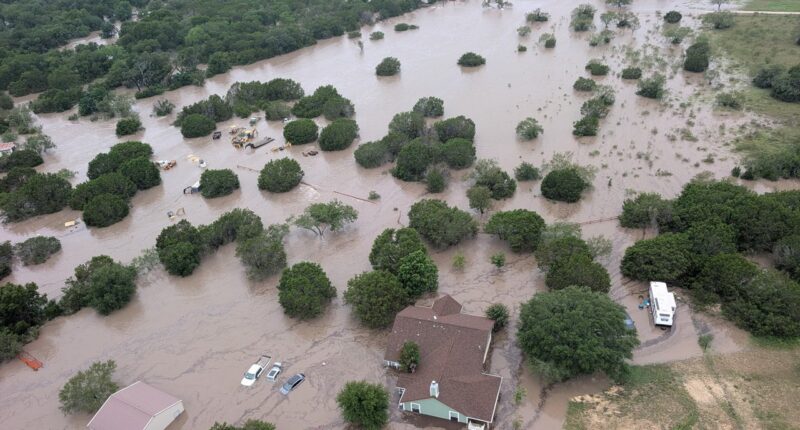As of Monday evening, the death toll from the flash flooding in Texas has reportedly surpassed 100, with some precious little girls from a Christian summer camp yet to be found. At least 27 campers and counselors are among those who lost their lives. Each successive news alert is worse than the last, confirming our deepest fears about those missing.
Moments like these call for deep reflection on what we believe about darkness and light, good and evil, life and death, suffering and a sovereign God.
I wrestled with these themes almost three years ago, when my dear friend Tyler died an untimely death. One of his favorite songs, “House of God Forever,” comes to mind almost as often as he does, but especially on dark days like these:
God is my shepherd
I won’t be wanting …
He makes me rest
In fields of green by quiet streams
Even though I walk
Through the valley of death and dying
I will not fear
’Cause You are with me
Written by Jon Foreman, the song is a beautiful rehearsing of the truths of Psalm 23. I used to listen to it with Tyler, and now I turn to it and the psalm it mirrors for comfort in his absence and during other moments of trial, chaos, and loss. As Foreman sings, “Surely goodness will follow me” — just as it followed Tyler and the many Christians lost in the Texas flood — “in the house of God forever.”
But one line of this song woefully misses the meaning of the psalm and thus the comfort the psalm provides. For the psalmist speaks not of the “valley of death and dying” but of “the valley of the shadow of death.” For all who repent of their sin and believe the gospel, for those who put all their hope in the blood of Christ, death is a nasty but inanimate “shadow.” Here’s Charles Spurgeon on the matter:
And, then, it is not “the valley of death,” but “the valley of the shadow of death,” for death in its substance has been removed, and only the shadow of it remains. … Nobody is afraid of a shadow, for a shadow cannot stop a man’s pathway even for a moment. The shadow of a dog cannot bite; the shadow of a sword cannot kill; the shadow of death cannot destroy us. Let us not, therefore, be afraid.
Matthew Henry’s commentary on Psalm 23 provides yet more comfort, reminding the reader that “it is a walk through” the valley of the shadow of death (emphasis mine). “[God’s people] shall not be lost in this valley, but get safe to the mountain on the other side. Death is a king of terrors, but not to the sheep of Christ.” For Christ, the Good Shepherd, will not lose any one of His sheep. Those He redeemed with His own blood can never be plucked from God’s hand.
Yet in reciting these truths to avoid the temptation of despair, Christians should resist the dual temptation of dismissal amid such unspeakable suffering. For although we have confidence that Jesus defeated sin and death on the cross, we still await with tears and groaning the ultimate future victory. Neither doubting believers nor lost souls gain from our being cavalier about present death and grief. They don’t need Pollyanna-ish platitudes wrapped in out-of-context Bible verses. Rather, we should look to Jesus for his perfect example of compassion and weep with those who weep, praying earnestly for the God of all comfort to give redemption and supernatural peace.
Nor should Christians give in to despair, for we have hope that is alive. In the wake of the deadly tsunami in Haiti in 2004, David Bentley Hart penned these words in First Things. They are just as instructive now as we grapple again with the “death of a child” and the “tears of a small girl”:
As for comfort, when we seek it, I can imagine none greater than the happy knowledge that when I see the death of a child I do not see the face of God, but the face of His enemy. … [This faith] has set us free from optimism, and taught us hope instead. We can rejoice that we are saved not through the immanent mechanisms of history and nature, but by grace; that God will not unite all of history’s many strands in one great synthesis, but will judge much of history false and damnable; that He will not simply reveal the sublime logic of fallen nature, but will strike off the fetters in which creation languishes; and that, rather than showing us how the tears of a small girl suffering in the dark were necessary for the building of the Kingdom, He will instead raise her up and wipe away all tears from her eyes — and there shall be no more death, nor sorrow, nor crying, nor any more pain, for the former things will have passed away, and He that sits upon the throne will say, “Behold, I make all things new.”
May we cling to this hope, as the hope-giver clings faithfully to us. And may we remind ourselves of the unshakable truth from the Apostle John that, even as we walk through the valley of the shadow of death, “The light,” which is to say Christ, “shines in the darkness, and the darkness has not overcome it.”








